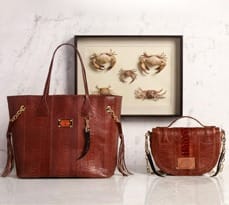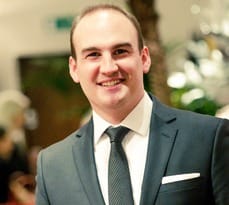 Think of luxury brands and the imagination instantly speeds off to Paris, Milan, London and New York.
Think of luxury brands and the imagination instantly speeds off to Paris, Milan, London and New York.
South Africa is not the first place that springs to mind and it’s this very perception that a new company is seeking to challenge by creating the first luxury brand to offer a range of leather goods that are African to their soul.
The materials, designs and workforce behind the bags, purses and wallets from Okapi (named after an unusual giraffe-like mammal) are all sourced from South Africa. The idea came to Okapi founder, Hanneli Rupert, when she was seeking to get involved in sustainable job creation in South Africa. A Fine Arts degree led her down the design route:
I wanted to do something creative here in South Africa. I knew we had great craft and manufacturing skills. I started from scratch and went round the country meeting women’s groups doing beading and the guys running the tanneries and I also set up a crochet workshop, working alongside charity Ikamva Labantu. I worked with the rangers who cull animals in private reserves the national parks to make sure everything we are doing is ethical and sustainable – we basically use materials like skins and horn that they would throw away. I wanted everything to be South African.
A principle that also extended to choosing a business manager. South African Devin Sinclair was fresh from his MBA at Cambridge Judge Business School when Rupert recruited him to help run her fledgling business. Selling luxury bags was not his plan post-MBA, but Sinclair is passionate about Okapi’s potential to make a difference back home:
The more the business grows, the more the benefits feed back to South Africa, giving work and promoting the country. It sends quite a powerful statement when people realise this very high quality item is made entirely of South African talent, skill and business acumen.

That’s not to say they will only sell in or from South Africa. Sinclair is clear that the non-negotiables are all about the product and how it is made and do not extend to how or where it is marketed and sold. Okapi have their eyes set firmly on international markets:
“Hanneli launched Okapi in Africa first in 2010 and it will always be our primary market, but we also intend to tap into the luxury markets abroad in places like London and New York – anywhere people shop for unique investment pieces.”
And Sinclair has a robust response to any suggestions of a disconnect between making and selling goods far beyond the reach of most South Africans:
“Every bag we sell creates opportunities for manufacturers and suppliers back home. We know all our suppliers individually and our success feeds back to them and their families.”
While a post-MBA life in fashion may not initially have been on Sinclair’s agenda, his experiences in the MBA quickly begun pointing him in that direction:
Two of my MBA projects turned out to be in fashion – the first with an online fashion retailer, Zalando, which then lead me to pursue an MBA internship with Burberry. They provided great experience and are opportunities that would not have come my way without the MBA.
His previous experience, running a chain of successful espresso bars in South Africa, a stint as a chartered accountant with Deloitte and working directly under the CEO of Invicta Holdings, preceded his MBA, which he chose to do at Cambridge because of the “international classes and the broader perspective they bring to both life and the wider business world”.
A one-year course was a priority for me as I didn’t want to be out of the world of business for too long and I was also attracted by the small classes – a great way to be taught – and it allowed for the formation of very strong bonds between classmates. The flexibility of the programme also allowed me to tailor my MBA to concentrate on venture capital and entrepreneurship, which was very attractive as well.
With its unique vision and ambition, the old proverb ‘out of Africa – always something new’ seems perfect for Okapi as it takes on the mantle of Africa’s first 100 per cent luxury brand.

